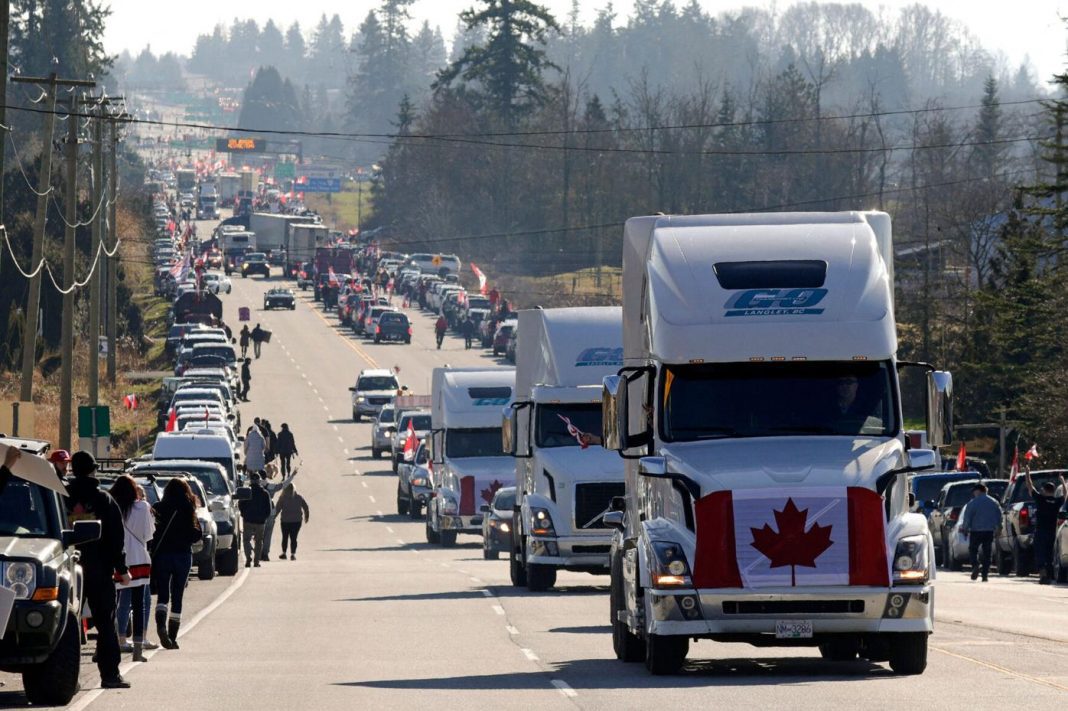The Ambassador Bridge is once again flowing between the United States and Canada after a week-long blockade was removed by Windsor Police. However, the days that the corridor was impeded by the protesters, has created another economic hurdle that the auto industry will need to overcome.
It’s estimated that the auto industry’s related shutdowns and idled lines will cost around $300 million in losses, according to Anderson Economic Group who analyzed the effects. Of the losses, nearly $150 million are in lost wages alone, suffered by assembly plant workers when their shifts were canceled. Michigan auto workers were hit the hardest, accounting for over one-third (estimated $51.26 million) of the lost wages.
Parts used in assembly cross the Michigan-Ontario border over the Ambassador Bridge. With traffic at a standstill, it only took hours for carmakers including Ford, Toyota, Stellantis, and General Motors to see parts shortages occurring. It’s the busiest land crossing in North America.
Patrick Anderson, principal, and CEO at Anderson Economic Group said, “The losses we’ve estimated here are real losses that are unlikely to be recouped. We’re already assuming that 90% plus of these parts get used, get to their destination, and get put into vehicles, but the opportunity to build these cars in many cases has been lost.”
Resilient auto industry to battle back
That sentiment doesn’t always ring true for the auto industry where setbacks are often seen as a challenge to overcome.
Director of the University of Windsor’s Cross Border Institute, Bill Anderson, said, “If it was a part for a car that didn’t come, and as a result of that an assembly line had to shut down, the economic impact might be quite larger than the value of the part that couldn’t come across.”
Anderson says that it will take much longer than the week-long blockade for the auto industry to recover. “If you have an industrial plant and it has a certain level of output and now you’re saying, ‘we just lost … let’s say it was four or five days, how do we make that all up?’ You can’t make it up in four or five days because you’re still got to produce what you would normally produce in those days, so you do 10% more every day for the next 40 days.”
US-Canada trade relations could be affected
In a statement, Michigan Governor Gretchen Whitmer said, “It’s time to get traffic and trade moving across North America’s busiest land border crossing again. I will always stand with every hardworking Michigander and do whatever it takes to ensure that our businesses can keep humming along.”
The notorious trucker blockade has made headlines worldwide. Not only has the auto industry been affected to the tune of $300 million, but the overall economic impact is exponentially higher. Roughly $323 million in goods crosses the Ambassador Bridge daily.
It’s possible that the protest will change international trade between Canada and the US as the “Freedom Convoy”, as they’re known, has exposed fragility along the corridor between the two nations. Carmakers could consider the potential impact of another disruption when choosing where to produce parts and assemble cars. That could strain relations between the two nations who vie for stable, mid-income jobs for their residents.
Did you enjoy this article from Jason Unrau? Read other articles on CBT News here. Please share your thoughts, comments, or questions regarding this topic by submitting a letter to the editor here, or connect with us at newsroom@cbtnews.com.
Be sure to follow us on Facebook and Twitter to stay up to date or catch up on all of our podcasts on demand.
While you’re here, don’t forget to subscribe to our email newsletter for all the latest auto industry news from CBT News.










